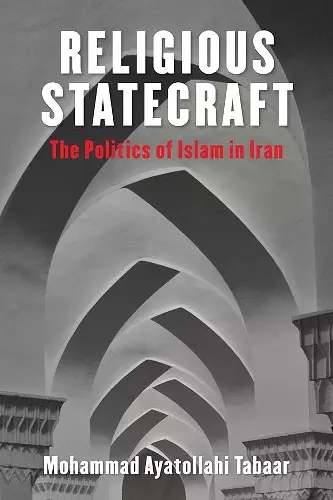Religious Statecraft
The Politics of Islam in Iran
Mohammad Ayatollahi Tabaar author
Format:Paperback
Publisher:Columbia University Press
Published:15th Nov '19
Should be back in stock very soon

Since the 1979 revolution, scholars and policy makers alike have tended to see Iranian political actors as religiously driven—dedicated to overturning the international order in line with a theologically prescribed outlook. This provocative book argues that such views have the link between religious ideology and political order in Iran backwards. Religious Statecraft examines the politics of Islam, rather than political Islam, to achieve a new understanding of Iranian politics and its ideological contradictions.
Mohammad Ayatollahi Tabaar traces half a century of shifting Islamist doctrines against the backdrop of Iran’s factional and international politics, demonstrating that religious narratives in Iran can change rapidly, frequently, and dramatically in accordance with elites’ threat perceptions. He argues that the Islamists’ gambit to capture the state depended on attaining a monopoly over the use of religious narratives. Tabaar explains how competing political actors strategically develop and deploy Shi’a-inspired ideologies to gain credibility, constrain political rivals, and raise mass support. He also challenges readers to rethink conventional wisdom regarding the revolution, Ayatollah Khomeini, the U.S. embassy hostage crisis, the Iran-Iraq War, the Green Movement, nuclear politics, and U.S.–Iran relations. Based on a micro-level analysis of postrevolutionary Iranian media and recently declassified documents as well as theological journals and political memoirs, Religious Statecraft constructs a new picture of Iranian politics in which power drives Islamist ideology.
[An] important and innovative book....a new take on an old puzzle. -- Ray Takeyh * Survival *
A welcome new study on Iranian politics and the complex relationship between religion and state since the country's 1979 revolution. * Digest of Middle East Studies *
Tabaar depicts Ayatollah Khomeini's nimble ability to tailor religious and nationalist ideology to outmaneuver the Shah, the Iranian Left, and factional opponents. Though unabashed in arguing that political expediency has determined the regime's selections from its toolkit of revolutionary religious doctrine, Religious Statecraft subtly portrays how factions struggle not so much to "tell people what to think" as "what to think about." -- Jack Snyder, Columbia University
Continually changing narratives—based on individual, factional, or regime interests rather than on any consistent or immutable commitment to Islamic teachings and principles—define the ebbs and flows of Iran’s postrevolutionary politics. As Tabaar puts it, ‘there is no such thing as political Islam. There is, however, a politics of Islam.’ Through meticulous and extensive use of official, semiofficial, independent, and oppositional media, both in Iran and abroad, Religious Statecraft illustrates and persuasively proves this argument. -- Ali Banuazizi, Boston College
The politics of the Islamic Republic of Iran has been characterized by ideological inconsistency from its beginning. But Tabaar goes beyond describing the way in which leaders change core ideas. He advances a provocative argument that ideology does not guide decision making directly. Instead, leaders mold their principles to meet the political needs of the moment, restrained not by the contents of those ideas but largely by the need to mobilize followers. -- Nathan J. Brown, George Washington University
The author constructs a refreshing, if somewhat dense and detailed, picture of Iranian politics in which power drives Islamist ideology. * Choice *
The main thrust of the book is important and worth repeating, considering the world we live in. A misunderstanding of how the Iranian political system works might lead to adoption of policies by powerful regional and global actors with irreparable outcomes. * Middle East Journal *
An important and timely contribution...It ought to be on the reading list of any policy maker who wants to better understand the Islamic Republic's foreign policy. * Perspectives on Politics *
This book can be of value to a variety of readers. Obviously scholars and students of Iran and Middle East politics will benefit from its insights, as will those scholars of religion and international relations to whom the above theoretical insights apply. But the book could easily be used in courses on a variety of topics in international security, from nuclear proliferation to revolutions. Finally, while I may have preferred more theoretical discussions, the focus on empirics and avoidance of jargon will make this book accessible for non-academics with an advanced interest in Iran. * Terrorism and Political Violence *
As historians and foreign policy scholars continue to study Iran’s recent modern era especially since the Green movement, Tabaar’s groundbreaking work describing internal factional conflicts and religious narrative creation will come into an even clearer view. Furthermore, while Tabaar’s book focuses largely on internal Iranian dynamics, its insights within the context of politics, religion, and ideology are applicable across many academic disciplines. * H-War *
Stand[s] out among the existing studies of the Islamic Republic and its supposedly unfathomable political behavior. * American Historical Review *
ISBN: 9780231183673
Dimensions: unknown
Weight: unknown
392 pages